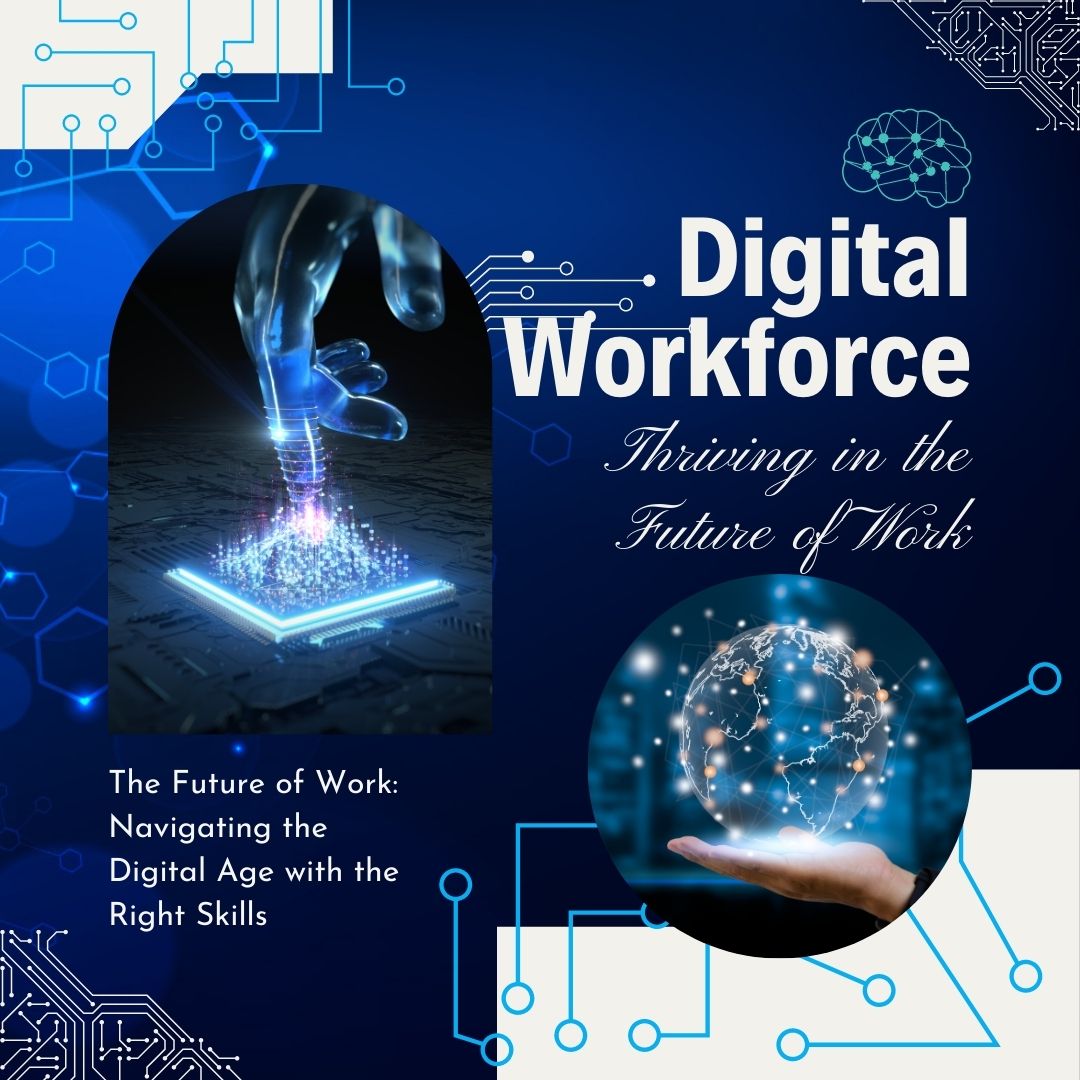Introduction
In today’s fast-paced world, work is rapidly evolving due to technological advancements. The digital age has not only created new job opportunities but has also rendered some traditional roles obsolete (Bughin, Manyika, & Woetzel, 2015). To remain competitive and achieve success in your career, it is crucial to adapt to this changing work environment. In this blog post, we will explore the essential skills you need to thrive in the digital age.
Soft Skills for Success in the Digital Age
Soft skills are personal attributes that enable individuals to interact effectively and harmoniously with others. In the digital age, where collaboration and teamwork are prevalent, these skills are of utmost importance. Let’s delve into some key soft skills necessary for success:
- Communication Skills: Effective communication through various mediums such as written, verbal, and digital communication (Yazdanifard, 2012) is vital for collaboration and building strong professional relationships in a digital world.
- Collaboration and Teamwork: Working well with others and contributing positively to a team’s success are essential skills in the digital age (Friedman, 2013). As remote work and virtual teams become more common, the ability to collaborate effectively across different locations and time zones is invaluable.
- Adaptability and Flexibility: The digital age brings constant change and evolving technologies. Being adaptable and flexible allows you to embrace new tools, processes, and ways of working (Chen & Huang, 2018). The ability to quickly adapt to changing circumstances is vital for thriving in a dynamic work environment.
- Critical Thinking and Problem-Solving: Analyzing situations critically and finding creative solutions to problems are highly valued skills in the digital age (Kumar & Dhawan, 2013). With complex challenges arising from technological advancements, the ability to think critically and approach problem-solving with a fresh perspective is essential.
- Time Management and Organization: Effective time management and organizational skills are crucial for maintaining productivity and meeting deadlines in a fast-paced digital environment (Varghese, 2017). Mastering these skills allows you to stay focused and accomplish tasks efficiently.
Expanding Soft Skills in the Digital Age
In addition to the mentioned soft skills, several others are important in the digital age. Let’s explore a few more:
- Emotional Intelligence: The ability to understand and manage emotions, both your own and others’, is crucial in virtual settings where face-to-face interactions may be limited. Developing emotional intelligence enables effective communication and collaboration (Goleman, 1995).
- Cultural Competence: With global connectivity, working with diverse teams is common in the digital age. Cultural competence allows individuals to appreciate and understand different cultural norms, enabling effective collaboration across borders (Deardorff, 2006).
- Resilience: The digital age can be demanding and fast-paced, requiring individuals to bounce back from setbacks and adapt to change. Resilience enables individuals to cope with challenges, maintain a positive mindset, and continue to perform effectively (Tugade & Fredrickson, 2004).
Technical Skills for the Digital Age
In the digital age, technical skills are fundamental to thriving in various industries. Here are some key technical skills that will empower you:
- Digital Literacy and Proficiency: With digital technologies pervading every aspect of work, it is vital to have a solid foundation in using digital tools and platforms effectively (Livingstone & Helsper, 2007). This includes proficiency in using productivity software, cloud platforms, and online collaboration tools.
- Coding and Programming: The ability to write code and create software programs is highly sought-after in the digital age. Understanding programming languages and having the skills to develop and maintain software applications can open up numerous opportunities in the technology sector.
- Data Analysis and Interpretation: Proficiency in collecting, analyzing, and drawing insights from data is increasingly valuable in the era of big data (Murray & Berch, 2018). Skills in data analysis tools, statistical analysis, and data visualization techniques allow you to make data-driven decisions and contribute to business growth.
- Artificial Intelligence (AI) and Machine Learning (ML): AI and ML technologies are transforming industries and driving innovation. Understanding AI and ML concepts, algorithms, and tools enables you to leverage these technologies to improve processes, automate tasks, and gain a competitive edge (Jordan & Mitchell, 2015).
- Cybersecurity and Privacy: With the growing prevalence of cyber threats and data breaches, knowledge of cybersecurity and privacy practices is essential (Kshetri, 2017). Understanding how to protect digital assets, implement security measures, and ensure compliance with data privacy laws is vital for maintaining trust and safeguarding sensitive information.
The Importance of Lifelong Learning
The digital age is characterized by rapid technological advancements and constant change. To thrive in this dynamic landscape, adopting a mindset of lifelong learning is crucial. Here are some avenues for acquiring new skills and knowledge:
- Online Learning and Resources: The internet offers a wealth of online courses, tutorials, and educational resources to enhance your skills and stay up-to-date with emerging trends. Platforms like Coursera, Udemy, and LinkedIn Learning provide access to a wide range of courses taught by industry experts.
- Professional Development Opportunities: Many companies and organizations invest in employee training and development programs. Take advantage of these opportunities to acquire new skills, attend workshops or seminars, and participate in relevant conferences or industry events.
- Mentorship and Networking: Building connections with experienced professionals in your field can provide invaluable guidance and insights. Seek out mentors who can offer advice, share their expertise, and help you navigate your career in the digital age.
- Experiential Learning: Gain hands-on experience through internships, freelance projects, or volunteering opportunities. Practical exposure to real-world scenarios allows you to apply your skills, learn from challenges, and develo
Examples of Success
Several individuals and organizations have successfully adapted and thrived in the digital age. Let’s explore a couple of inspiring examples:
- Tesla: Tesla has disrupted the automotive industry with its electric cars and advanced software technology (Klamer & Van Dalen, 2017). By embracing innovation, renewable energy, and cutting-edge technologies, Tesla has revolutionized transportation and positioned itself as a leader in the electric vehicle market.
- Amazon: Amazon has transformed the retail industry with its e-commerce platform and logistics technology (Mulligan, 2018). Through continuous innovation, customer-centric approaches, and data-driven decision-making, Amazon has become a global powerhouse, changing the way people shop and setting new industry standards.
Conclusion
In conclusion, developing the essential skills to thrive in the digital age is paramount for individuals and organizations alike. By honing soft skills like communication, collaboration, adaptability, critical thinking, and time management, individuals can navigate the digital landscape with agility and efficiency. Additionally, acquiring technical skills such as digital literacy, coding, data analysis, AI/ML, and cybersecurity enables individuals to leverage technology and drive innovation.
Embracing lifelong learning through online resources, professional development programs, mentorship, and experiential learning is crucial for staying ahead in the ever-evolving digital age. By continuously updating skills and knowledge, individuals can adapt to emerging technologies, seize new opportunities, and succeed in their careers.
Remember, the digital age offers immense possibilities, and by equipping yourself with the right skills and a growth mindset, you can thrive in this transformative era of work.


Tharushi Imasha Kumarasiri
Jun 24, 2023
0